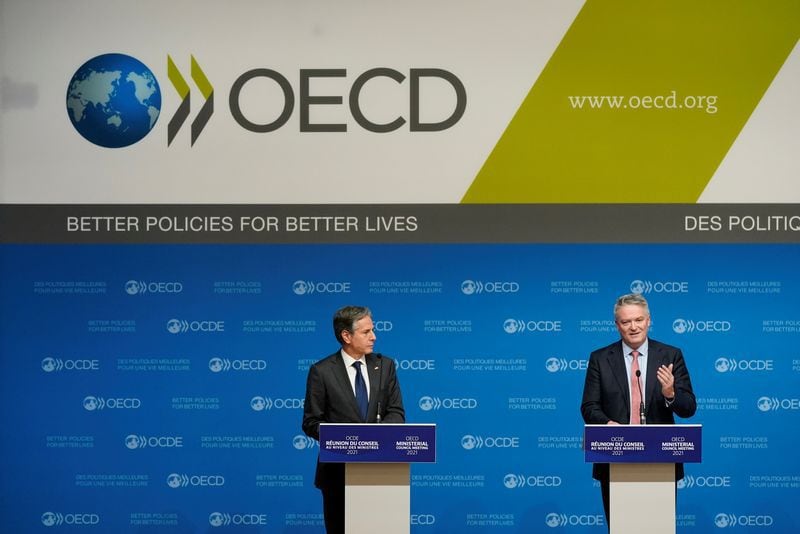
Day 23 of the Russian invasion of Ukraine. As the war progresses, with no certainty so far as to how and when it will end, major international institutions have warned that conflict will necessarily have an impact on global growth and inflation.
The economic recovery, after two years of the coronavirus pandemic, is now interrupted by the attack by Vladimir Putin. While forecasts are often not entirely accurate, on Wednesday, the International Monetary Fund warned that this conflict would slow the recovery and lead to increased inflation. According to the agency, its previous forecast of 4.4% global growth this year should be forgotten and it is preparing to correct this figure downwards at its meetings in mid-April.
Around the same time, the Organization for Economic Cooperation and Development (OECD), after analyzing the first quantified consequences of the war on European soil, was trying to predict a somewhat more cautious scenario. According to Secretary General Mathias Corman's remarks, “we are not in a position to present general forecasts due to the evolving nature of the situation”
For analysts, another expected reflection was the Fed's decision to raise interest rates by a quarter point on Wednesday, in a move aimed at addressing galloping inflation in the United States, placing it between 0.25% and 0.50%.
“Russia's invasion of Ukraine is causing enormous human and economic hardship. The implications for the economy are very uncertain, but in the short term, the invasion and related events are likely to generate additional upward pressure on inflation and weigh on the Fed's economic activity,” the US agency said in its recitals.

Another crucial parameter is British monetary policy, a strategic financial center for investors. The Bank of England (BoE), the first major central bank to begin tightening monetary policy, is bringing borrowing costs back to pre-pandemic levels. Its turn came the day after the first retouching by the US Federal Reserve.
The art of predicting what will happen marks the pulse of the markets and of these times. Mathilde Lemoine, chief economist at Edmond de Rothschild, estimates a drop in world GDP limited to 0.7 points to 3.9% this year if the conflict is not internationalized.
“We don't yet know how this will play out completely, but we know it will hurt the global recovery and further increase inflation,” said Laurence Boone, the organization's chief economist. Based on current information available, the Organization estimates the loss of world GDP at more than one percentage point this year. This would reduce growth to 3.5%.
The Russian attack on Ukraine unleashed an arsenal of sanctions by Europeans and Americans against the Kremlin, which causes a shock in supply chains, already suffocated by the Covid 19 crisis. The prices of energy and many other products, particularly agricultural and derivative products, have risen these days. These movements should not find rapid calm.
In this context, the eurozone seems to be the hardest hit. It has seen a decrease of 1.4 points while in the United States the decline will be limited to 0.9 points. So far, the first to tweak its predictions about the war conflict, was the German Economic Institute (IFW). Closely observed by the relevance in the European bloc, he indicated that he expects Germany's GDP to grow by only 2.1% compared to 4% previously. From France, the previous day, the country's Institute of Statistics (INSEE) had pointed out that the war in Ukraine would reduce the growth of the hexagon by one point.
For the OECD, as a result of the impact on commodity prices, of which Russia and Ukraine are the leading suppliers, additional inflation in the euro area is estimated at 2.4%, while the United States is doing somewhat better, leading to an increase of 1.5% more.
Boone, during a press conference, explained that “if fuel prices are doubled, this will translate into an additional percentage point of inflation and half a point of growth less.” In Europe, fuel prices have risen by up to 40%, even provoking protests and strikes by carriers.
This week, there was also another harsh prediction from the International Monetary Fund. According to the agency, food insecurity is likely to worsen in parts of Africa and the Middle East, where countries like Egypt import 80% of their wheat from Russia and Ukraine. A complete cessation of wheat exports from these countries would cause “a greater risk of economic crises in some countries, but also to humanitarian disasters with a sharp increase in poverty and hunger”

The inflation of food prices generated by rising prices of wheat (+90%), corn (more than 40%), two cereals in which Ukraine and Russia are central players, in addition to possible shortages, will cause strong internal tensions in the other producing countries. Higher international price pressure will encourage exports in the face of domestic demand, something well known in Latin American countries.
These scenarios could be even more pessimistic. Global growth will be severely affected, especially if the conflict continues over time. This would involve upward loss corrections.
Meanwhile, the International Energy Agency said on Friday that it expected the next meeting of the Organization of Petroleum Exporting Countries (OPEC) to “ease the market” and called on oil-producing countries to be “on the safe side.” A call to significantly increase its production, and to tip the balance towards the downward price of hydrocarbons.
Últimas Noticias
Debanhi Escobar: they secured the motel where she was found lifeless in a cistern

The oldest person in the world died at the age of 119

Macabre find in CDMX: they left a body bagged and tied in a taxi
The eagles of America will face Manchester City in a duel of legends. Here are the details

Why is it good to bring dogs out to know the world when they are puppies




